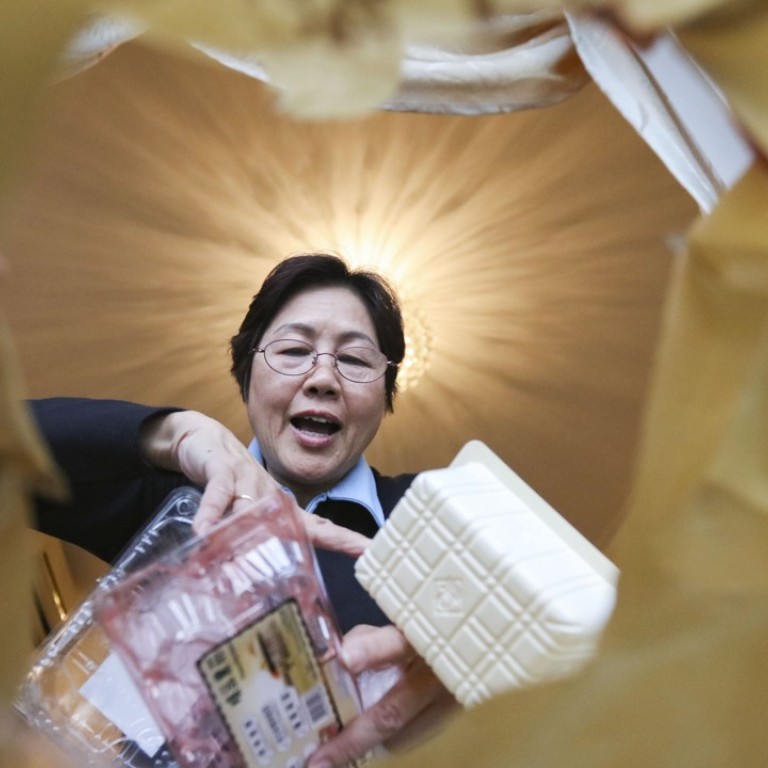
New recycling policy targeting plastic and paper types not well-received by Hongkongers
Green group says latest government recommendations may increase burden on city’s landfills and undermine good habits
An amended recycling policy targeting specific types of plastic and paper has not been well-received by some Hongkongers, who continue to discard other items into designated bins.
Earlier this month, the Environmental Protection Department kicked off a campaign urging consumers to change their recycling behaviour regarding waste paper and plastics. The move was to align with a tightened policy in mainland China.
Starting next year, authorities across the border will stop importing Hong Kong’s plastic waste from daily usage and its unsorted scrap paper to process for recycling.
Will recycling only drink bottles and personal care products lead to more waste sent to Hong Kong landfills?
According to the department, only three types of paper – paperboard, newspaper and office paper – should be recycled. For plastic waste, only two types – containers for beverages and personal care products – should be placed into recycling bins after they are rinsed.
Some consumers are not in a rush to adopt the new policy, as they are concerned about more waste being thrown into general rubbish bins.
Alice Lai Siu-chee, 66, a housewife in Tseung Kwan O, said: “I don’t care. I would still place [other types of recyclables] into the bins and let recyclers handle it.”
I don’t care. I would still place [other types of recyclables] into the bins and let recyclers handle it
Lai has bottles of detergent and bleach in her home – preferred items for recycling under the new recommendations – yet these are only discarded when their contents are fully used, which may take weeks or months. Items forming daily plastic waste from her household comprise plastic bags and boxes used to carry fruits or grocery, but these do not fit the bill under the selective recycling policy.
“If we throw all these directly into rubbish bins, aren’t we bringing extra burden to the landfills?” Lai said. She added that she had always been keen on waste reduction as her home was near to a landfill.
According to a recent department report, the amount of plastics entering the city’s landfills daily last year dropped by 2 per cent compared with 2015, but the per capita disposal rate of municipal solid waste last year hit 1.41kg per day, a new high since 2007.
Samantha Chu, 30, a Kowloon Bay resident, also said the new advice for recycling was difficult to follow. “I don’t feel good throwing things which I have been recycling into a bin for general waste.”
I don’t feel good throwing things which I have been recycling into a bin for general waste
As Chu seldom buys bottled drinks, the plastic waste she generates mostly include containers for meat sold in supermarkets.
The Post visited three housing estates – Kornhill Gardens in Quarry Bay and Wan Tau Tong Estate and Uptown Plaza in Tai Po – and found that items deemed unsuitable for recycling were still widely thrown into recycling bins in these areas.
They include transparent plastic containers for food, as well as plastic packages and bags.
When it came to paper, it seems conforming to the new policy was easier, as designated bins were found to contain newspaper and random paper sheets, items targeted for recycling.
But the signs on some of the paper bins can be confusing to users – some still showed plastic bags and packaging materials as accepted items for recycling.
Shift in mainland policy could spell disaster for Hong Kong recycling
Edwin Lau Che-feng, executive director of environmental group The Green Earth, criticised the government policy, calling it a form of backtracking.
“The public has already developed a good habit of recycling ... but they are now resigned to this change in policy,” Lau said.
He also expressed concern over a higher amount of plastics and paper ending up in landfills with the new practice.
Regarding recycling of waste plastics, Lau said the government could subsidise recyclers to purchase machines for easier sorting, and allow the public to place all types of items into recycling bins.
“This way the efficiency and practicality would be better than the current method,” he said.
A department spokeswoman said publicity work would continue and an outreach team would visit housing estates to promote proper recycling. Signs on bins indicating what should be recycled would be gradually updated.

